Aquatic Invertebrates
Media

Species Types
Scientific Name
Various species in the subclass Hirudinea
Description
Most people are repulsed by leeches. But once you get past the fact that many species are parasitic bloodsuckers, you will discover that they are fascinating creatures with an important role in nature.
Media

Species Types
Scientific Name
Freshwater species in the phylum Bryozoa
Description
Bryozoans are tiny, filter-feeding invertebrates. They create colonies that can be mossy, branching, or round and jellylike.
Media

Species Types
Scientific Name
About 32 North American species in the family Notonectidae
Description
Sometimes called “water bees” or “water wasps,” backswimmers are predaceous and can deliver a painful bite if mishandled. True to their name, they swim belly-up, and their backs are keeled like a boat, which makes back-swimming easier.
Media

Species Types
Scientific Name
Species in the beetle family Gyrinidae
Description
Groups of whirligig beetles swim on the water surface in quick, random patterns, searching for food. They have two pairs of eyes — one pair above water, one pair below — to help them quickly and accurately capture their prey.
Media
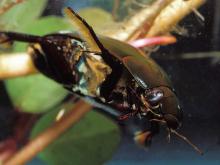
Species Types
Scientific Name
Species in the beetle family Dytiscidae
Description
Like many aquatic insects, these large oval beetles prey voraciously on other aquatic organisms. Excellent swimmers, they fly well, too, and are often attracted to lights.
Media
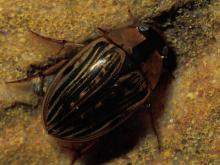
Species Types
Scientific Name
Beetles in the family Hydrophilidae
Description
Water scavenger beetles are a mostly aquatic family. They are similar to predaceous diving beetles, but unlike them many have a distinctive spine running down the center of their bellies.
Media

Species Types
Scientific Name
About 125 species in North America in the family Corixidae
Description
Water boatmen are one of the few aquatic true bugs that are not predatory and do not bite people. Instead, they suck juices from algae and detritus. Only a few types eat other small aquatic creatures.
Media
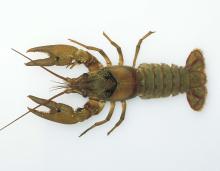
Species Types
Scientific Name
About 38 species in Missouri
Description
Crayfish are freshwater aquatic invertebrates that look a lot like small lobsters, to which they are related. There are about 38 species of crayfish in Missouri.
Media
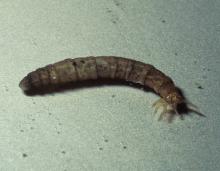
Species Types
Scientific Name
There are over 500 species of crane flies in North America.
Description
Crane fly larvae are tan or gray grubs that live in aquatic habitats or in moist places on the ground. The harmless adults resemble huge mosquitoes.
Media
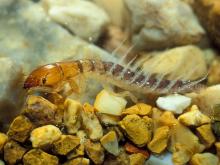
Species Types
Scientific Name
Sialis spp.
Description
Alderfly larvae look a lot like their cousins the fishflies, but instead of having pairs of fleshy tails, they have only a single tail pointing straight back.
See Also
About Aquatic Invertebrates in Missouri
Missouri's streams, lakes, and other aquatic habitats hold thousands of kinds of invertebrates — worms, freshwater mussels, snails, crayfish, insects, and other animals without backbones. These creatures are vital links in the aquatic food chain, and their presence and numbers tell us a lot about water quality.





















